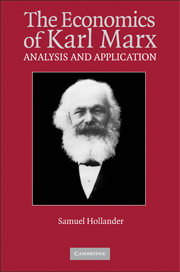Book contents
- Frontmatter
- Contents
- Preface
- Introduction
- Part One CAPITAL: PRINCIPLE FEATURES OF THE MARXIAN “CANON”
- Part Two ORIGINS: MARX IN THE 1840s
- 6 Marx's Economics 1843–1845
- 7 A “First Draft” of Capital 1847–1849
- Part Three A “SECOND DRAFT” OF CAPITAL: THE GRUNDRISSE 1857–1858
- Part Four A “THIRD DRAFT” OF CAPITAL: THE ECONOMIC MANUSCRIPTS 1861–1863
- Part Five TOPICS IN APPLICATION
- Conclusion: A Recapitulation and Overview
- Appendices
- Bibliography
- Index
7 - A “First Draft” of Capital 1847–1849
Published online by Cambridge University Press: 25 June 2009
- Frontmatter
- Contents
- Preface
- Introduction
- Part One CAPITAL: PRINCIPLE FEATURES OF THE MARXIAN “CANON”
- Part Two ORIGINS: MARX IN THE 1840s
- 6 Marx's Economics 1843–1845
- 7 A “First Draft” of Capital 1847–1849
- Part Three A “SECOND DRAFT” OF CAPITAL: THE GRUNDRISSE 1857–1858
- Part Four A “THIRD DRAFT” OF CAPITAL: THE ECONOMIC MANUSCRIPTS 1861–1863
- Part Five TOPICS IN APPLICATION
- Conclusion: A Recapitulation and Overview
- Appendices
- Bibliography
- Index
Summary
Introduction
This chapter explores the status of Marx's economics in the late 1840s, having in mind two later affirmations. First, there is Marx's claim in 1880 that his Poverty of Philosophy (1847) – the answer to Proudhon's Philosophie de la misère (1846) – “contains in embryo what after a labour of twenty years became the theory that was developed in Capital” (MECW 6: xviii). Second, in Capital itself Marx cites Wage Labour and Capital, a series of lectures delivered in Brussels late in 1847 and published in April 1849 – referred to by Rubel as Marx's “premier texte proprement théorique” (Rubel 1963: 1595) – as already containing the essentials of the mature surplus-value doctrine (MECW 35: 577). Particular attention will also be given a document entitled “Wages” composed in December 1847.
We have too Engels's assertion in his Preface of 1885 to Capital 2, in answer to charges made against Marx of plagiarism by Rodbertus in 1875, that by the late 1840s Marx had discovered the source of surplus value: “That … Marx knew very well … not only whence but also how ‘the surplus value of the capitalist’ originated is proved by his Poverty of Philosophy, 1847, and by his lectures on wage labour and capital, delivered in Brussels the same year and published … in 1849” (MECW 36: 11).
- Type
- Chapter
- Information
- The Economics of Karl MarxAnalysis and Application, pp. 194 - 232Publisher: Cambridge University PressPrint publication year: 2008



